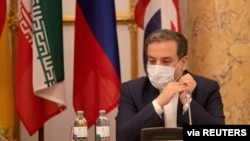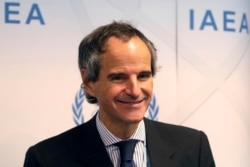Iran is studying a European Union proposal for an informal meeting between current members of Tehran's 2015 nuclear deal and the United States, but has yet to respond to it, Iranian Deputy Foreign Minister Abbas Araqchi said Saturday.
Iran and the United States have been at odds over who should take the first step to revive the 2015 accord. Iran insists the United States must first lift former President Donald Trump's sanctions, while Washington says Tehran must first return to compliance with the deal.
Iranian Foreign Minister Mohammad Javad Zarif suggested earlier this month a way to overcome the U.S.-Iranian impasse over who goes first in returning to the nuclear deal, saying EU foreign policy chief Josep Borrell could “synchronize” or “choreograph” the moves.
"We are studying Josep Borrell's proposal to hold an informal meeting of the 4 + 1 [nuclear deal members] with the United States and Iran, and we are consulting with our partners, including Russia and China, and we will respond to this proposal in the future," Araqchi said in an interview with state TV.
"However, we believe a U.S. return to the nuclear accord does not require a meeting and the only way for it is to lift the sanctions," Araqchi said.
'Diplomatic wrangling'
An Iranian government spokesman said earlier that Iran believes U.S. sanctions will soon be lifted despite continued "diplomatic wrangling" over reviving the nuclear deal, signaling Tehran's desire to end the impasse while not offering a new position.
The White House said on Friday that the United States planned to take no additional actions in response to pressure from Iran before potential talks with Tehran and major powers about returning to the deal.
However, government spokesman Ali Rabiei was quoted as saying by the official IRNA news agency on Saturday:
"We predict with confidence that diplomatic initiatives will result in a favorable outcome despite the diplomatic wrangling, which are a natural prelude to the return of the parties to their commitments, including the lifting of all sanctions in the near future."
Under the deal with major powers, Iran accepted curbs to its nuclear program in return for the lifting of international sanctions. Washington reimposed sanctions after Trump quit the deal in 2018, and Iran responded by violating some of the deal's nuclear limits.
Adding to pressure for a resolution to the impasse, a law passed by the hardline parliament obliges Tehran on Tuesday to limit the sweeping access given to U.N. inspectors under the deal.
The head of the International Atomic Energy Agency, Rafael Grossi, arrived in Tehran on Saturday on a scheduled visit, Iran's envoy to the agency, Kazem Gharibabadi, said on Twitter.
Grossi is to discuss ways to work with Iran in light of the possibility of scaling back cooperation.
Rabiei said the law "does not go against our commitment" to the agreement, nor is it "an obstacle to our appropriate response to American actions."






